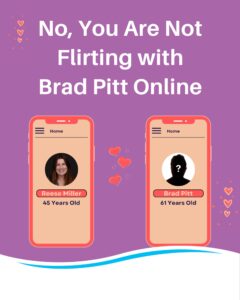 As we celebrate Valentine’s Day with flowers and chocolates, remember that not all roses are without thorns. According to the Federal Trade Commission, millions of people fall victim to online romance scams each year – and they can be some of the most emotionally and financially devastating.
As we celebrate Valentine’s Day with flowers and chocolates, remember that not all roses are without thorns. According to the Federal Trade Commission, millions of people fall victim to online romance scams each year – and they can be some of the most emotionally and financially devastating.
Fraudsters easily use stolen and artificial intelligence (AI)-generated images to create online dating or social media profiles of celebrities, doctors, military personnel and more. They spark up virtual relationships, quickly putting themselves in a position to ask for money and pull at the heartstrings of their targets.
Some romance scammers converse with their victim for weeks or months to grow an emotional connection before asking for financial support – and with readily available online AI tools, it’s easy for scammers to make the fantasy appear to be reality.
Warning signs of a romance scam include:
- Your connection professes love quickly
- They claim to be from the U.S., but overseas for business or military service
- They claim to need money for emergencies, hospital bills, travel, gambling debts, or other needs
- The person plans to visit, but doesn’t follow through because of an emergencies or other circumstances
To protect yourself and others, remember:
- If they ask for money, it’s a scam. Never send money to anyone you have never met in person.
- Talk to someone you trust about the online romance. A third party can often point out red flags that you may have missed.
- Never wire money from your bank account, buy gift cards, or send money to an online love interest. You won’t get it back.
- Be careful about what you post online. Scammers may use this information learn more about you or pose as you.
Visit this Federal Trade Commission article to learn more about romance scams and steps to avoid becoming a victim.
Contact your financial institution immediately if you sent any money or personal information, such as your account or online banking information, to a potential scammer.


